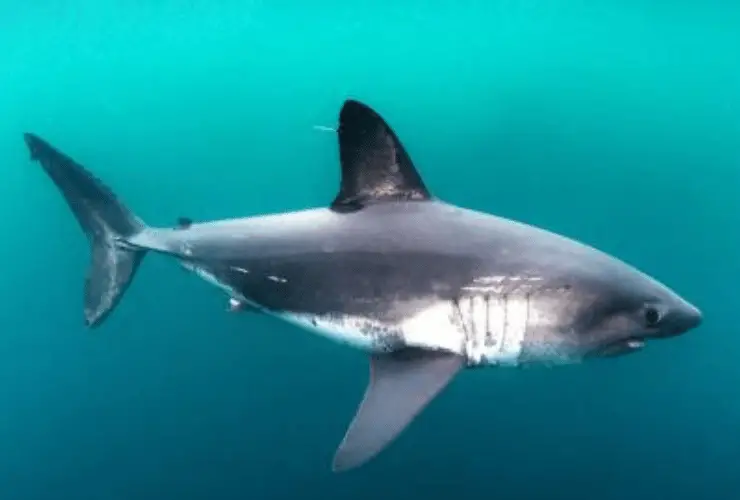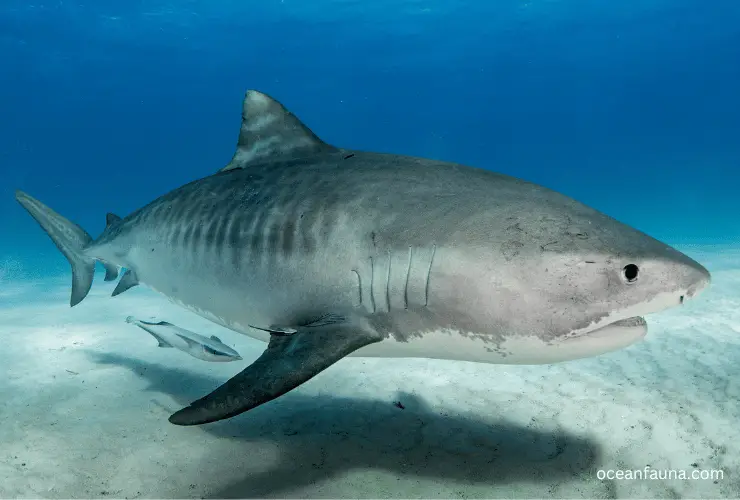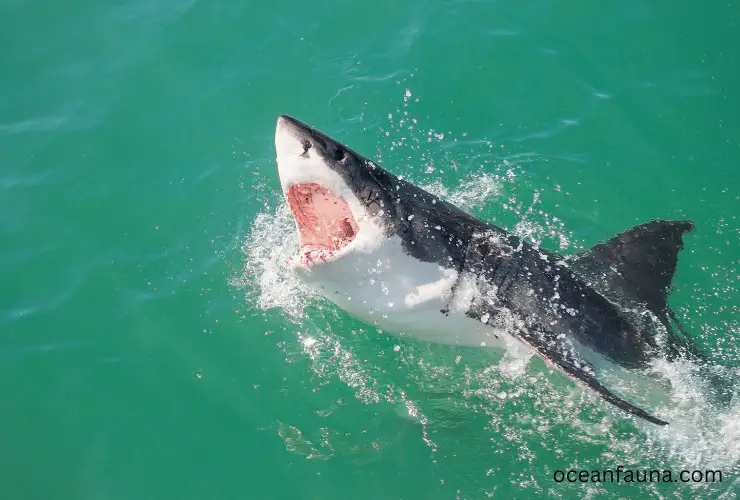Sharks usually make their home in places where their prey is. But when it is the matter of preference, “do sharks like warm water or cold water?” marine researchers will say most sharks typically like to live in warm water where the temperature ranges from 68 to 80 degrees Fahrenheit.
However, some sharks, like the Greenland shark and the Pacific Sleeper Shark, are able to withstand cooler waters. So, these sharks prefer living in colder temperatures ranging from 42 to 50 degrees Fahrenheit.
In this article, I will share details about the different types of sharks and their preferred temperatures. I will also discuss why some prefer warmer waters while others choose cooler ones.
Do Sharks Like Warm Water?
Most sharks prefer warm water, especially those living in tropical and subtropical climates. This includes species like the great white shark, bull shark, blacktip reef shark, gray reef shark, lemon shark, a white-spotted bamboo shark, nurse shark, and tiger shark.

These species are typically found in warm waters because they need warmth to survive and thrive. The warmer waters provide a more suitable environment for nurturing their young and finding plenty of food sources.
Why Do Sharks Like Warm Water?
The reason why these species like warm water is due to physiological needs related to temperature regulation. Warmer water helps these sharks regulate their body temperature, which is why they can be found closer to the surface, where the water temperature is higher than in deeper areas.
Additionally, the chemical makeup of warm ocean currents also provides them with greater amounts of nutrients and oxygen that help fuel their energy levels as well as support healthy growth and development. These temperatures also make it easier for them to find food.

Sharks have a unique ability known as thermoregulation which allows them to raise or lower their body temperature by moving between different layers of water depending on how warm or cold they are feeling at any given moment. This helps them conserve energy while searching for prey or migrating when needed.
Lastly, sharks often seek out shallow waters because they offer an abundance of food, such as crustaceans, mollusks, fish eggs, and smaller fish -all things that are attracted to warmer waters in particular.
Do Sharks Like Cold Water?
As discussed above, sharks can be found in a wide range of water temperatures, from frigid subarctic waters to tropical environments. Some species prefer cold temperatures and are found mostly in polar regions, like the Salmon Shark, which is found in the northern Pacific and Atlantic oceans.
Why Do Sharks Live in Cold Water?
Some sharks prefer colder waters because of the abundance of food available there. Colder temperatures typically increase the number of schooling fish, such as mackerel and herring, making it easier for the shark to find a meal.

Additionally, these colder regions tend to have more krill, another one of the common prey items for many species of shark. Besides having an abundance of food sources, cold water also helps sharks regulate their body temperature as they don’t have sweat glands or fur, which would provide insulation against extreme heat or cold.
How Does Water Temperature Affect Sharks?
Temperature and Habitat Requirements
Most sharks are ectothermic, or “cold-blooded” animals, so their body temperatures are largely determined by the temperature of the water in which they live. Therefore, water temperature plays a major role in determining where sharks can survive and thrive. Different shark species have different temperature preferences, usually within fairly narrow ranges.
Generally speaking, sharks prefer temperatures in the range of 20 to 26°C (68 to 80°F). When water temperatures drop below 10°C (50°F), many shark species will move to deeper, warmer waters or migrate to warmer areas.

Conversely, if the water rises above 28°C (82°F), some species may seek out cooler waters or move away from an area entirely.
For example, porbeagle sharks leave their nursery grounds when surface waters exceed 22°C (72°F). Thus, as ocean temperatures continue to rise due to global climate change, sharks may move away from traditional habitats or be unable to inhabit new areas that would otherwise provide suitable living conditions.
Behavioural Implications
Water temperature also influences a variety of other factors that affect how sharks behave and interact with their environment.
For instance, during colder months of the year, when water temperatures drop below 10°C (50°F), most shark activity decreases substantially as they become lethargic and less active due to their cold-blooded nature. This means they may spend more time resting on the seafloor than actively searching for prey and expending energy.
As water temperatures warm up again in summertime months, however, shark activity increases dramatically as they become more alert and active in response to rising temperatures and increased prey availability.
Reproductive Cycle
Finally, water temperature is essential in determining when certain shark species reproduce. Sharks go through a reproductive cycle that includes breeding seasons for different species at different times of the year; these breeding seasons can be directly linked with changes in local ocean temperature each season.
For example, female lemon sharks give birth to live pups during June and July; this coincides with peak sea surface temperatures along Florida’s southeast coast since these peak temperatures create an ideal habitat for growth and development during gestation periods.

Additionally, white shark mating behaviour is observed mainly between December and April off the coast of California; this also corresponds with higher sea surface temperatures in winter months compared with colder waters later in springtime.
Overall Impact on Shark Population Dynamics
To put it simply, the water temperature has an immense effect on sharks’ habits and capacity to populate certain locations around the world at different points due to changing environmental factors that come with seasonal changes or longer-term global warming developments.
Temperature can determine not just where a specific species lives but also when it reproduces and how much energy it expends looking for food sources throughout its lifespan; all of these elements combined ultimately shape population dynamics for individual shark species over time—for better or worse depending on location-specific trends over time periods ranging from years to decades or longer.
Is Warm Water Good for Sharks’ Metabolism?
Warm water is beneficial for a shark’s metabolism as it helps regulate the animal’s body temperature. Sharks are ectothermic creatures, meaning that their body temperature depends on the surrounding environment; therefore, warm water is essential in helping them maintain an optimal internal temperature.
Warm water is known to increase sharks’ metabolic rates, allowing them to swim faster and feed more efficiently.

Additionally, warm aquatic temperatures can help increase their energy levels, allowing them to hunt and capture prey more easily. This increased metabolism can also help sharks heal faster from injuries or illnesses because they have more energy to do so.
Furthermore, a higher metabolic rate can help increase their reproductive success as they are able to produce more offspring with greater chances of survival. Overall, it is clear that warm water is ideal for a healthy shark’s metabolism as it allows them to move faster, feed better and ultimately live longer.
Conclusion
It is evident that most sharks thrive in warmer waters, but some may be able to adapt to colder temperatures. Nonetheless, a warm climate provides the ideal environment for their growth and nourishment needs. As such, they need access to water at comfortable temperatures if they will survive and flourish.
Additionally, due to the direct correlation between water temperature and shark activity, reproductive cycles, and population dynamics, we should pay attention to global warming trends and their effects on aquatic wildlife. This can help us better understand how our actions can positively or negatively impact the environment and its many inhabitants.

11 thoughts on “Do Sharks Like Warm Water or Cold Water?”